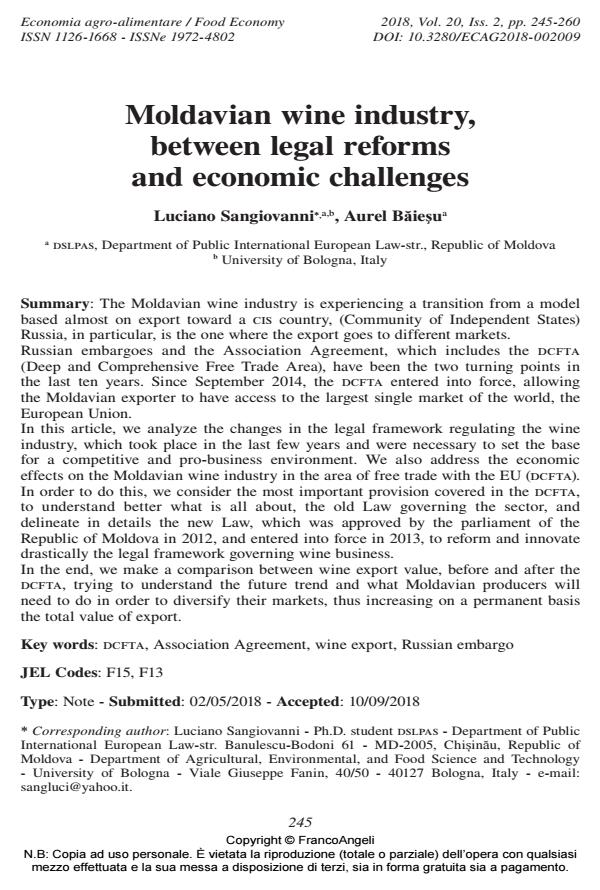Moldavian wine industry, between legal reforms and economic challenges
Journal title ECONOMIA AGRO-ALIMENTARE
Author/s Luciano Sangiovanni, Aurel Baiesu
Publishing Year 2018 Issue 2018/2
Language English Pages 16 P. 245-260 File size 249 KB
DOI 10.3280/ECAG2018-002009
DOI is like a bar code for intellectual property: to have more infomation
click here
Below, you can see the article first page
If you want to buy this article in PDF format, you can do it, following the instructions to buy download credits

FrancoAngeli is member of Publishers International Linking Association, Inc (PILA), a not-for-profit association which run the CrossRef service enabling links to and from online scholarly content.
The Moldavian wine industry is experiencing a transition from a model based almost on export toward a cis country, (Community of Independent States) Russia, in particular, is the one where the export goes to different markets. Russian embargoes and the Association Agreement, which includes the dcfta (Deep and Comprehensive Free Trade Area), have been the two turning points in the last ten years. Since September 2014, the dcfta entered into force, allowing the Moldavian exporter to have access to the largest single market of the world, the European Union. In this article, we analyze the changes in the legal framework regulating the wine industry, which took place in the last few years and were necessary to set the base for a competitive and pro-business environment. We also address the economic effects on the Moldavian wine industry in the area of free trade with the EU (dcfta). In order to do this, we consider the most important provision covered in the dcfta, to understand better what is all about, the old Law governing the sector, and delineate in details the new Law, which was approved by the parliament of the Republic of Moldova in 2012, and entered into force in 2013, to reform and innovate drastically the legal framework governing wine business. In the end, we make a comparison between wine export value, before and after the dcfta, trying to understand the future trend and what Moldavian producers will need to do in order to diversify their markets, thus increasing on a permanent basis the total value of export.
Keywords: Dcfta, Association Agreement, wine export, Russian embargo
Jel codes: F15, F13
- Adarov, A., & Havlik, P. (2016). Benefits and Costs of dcfta: Evaluation of the Impact on Georgia, Moldova and Ukraine. Joint Working Paper. Wien: Bertelsmann Stiftung (pp. 16-26).
- Bercu, V. (2018). Moldavian wines increasingly demanded growing value of export on 2017. Chisinau: Moldpress. -- Retrieved from: https://www.moldpres.md
- Cenuşa, D., & Emerson M. (2016). Moldova and Europe a short guide. Brussels, Chisinau: Centre for European Policy Studies, Expoert-Group (pp. 1-16). -- Retrieved from: http://dcfta.md
- Chemonics (2017). Strenghtening the Moldavian wine sector from grape to glass. -- Retrieved from https://chemonics.com/impact-story/strengthening-moldovan-winesector-grape-glass/
- European Commission (2014). EU-Republic of Moldova Deep and Comprehensive Free-Trade Area. Reading Guide. -- Retrieved from http://trade.ec.europa.eu/doclib/docs/2014/february/tradoc_152194.pdf.
- European Union council regulation 55/2008. (2008). -- Retrieved from http://trade.ec.europa.eu/doclib/docs/2008/july/tradoc_139804.pdf.
- Jozwiak, R. (2013). What exactly is an EU-Moldova Association Agreement. Prague: Radio Free Europe, Radio Liberty. -- Retrieved from: https://www.rferl.org
- Lazar, D. (2010). Re-think Wine Sector. In Competitiveness Enhancement and Enterprise Development Project. Chisinau: CEED (pp. 5-37).
- Madan, S., & Furdui, V. (2017). Trendurile industriei vinicole din Republica Moldova. United States of America International Development (USAID) Proiectul de Competitivitate. Chisinau (pp. 10-15).
- Onvv (2017). Conjunctura vitivinicola din Republica Moldova. Chisnau: ONVV (pp. 1-10).
- Policano, C. (2015). Moldova Ghidul Vinurilor. Chisinau: Buena Vista Social (pp. 8-16).
- Policano, C. (2016). Moldova, il vigneto sconosciuto. -- Retrieved from https://www.vinix.com/myDocDetail.php?ID=8537&lang=ita.
- Popa, A. (2015). DCFTA between Moldova and EU after one year. Chisinau: Export-Group (pp. 6-15).
- Preasca, D. (2018). Piata vinului 5 tari care cer vin moldovenesc. Chisinau: Timpul. Md. -- Retrieved from: https://www.timpul.md
- Radeke, J., Giucci, R., & Lupusor, A. (2013). Moldova’s trade policy: Strategy, DCFTA and Customs Union. Berlin-Chisinau: German Economic Team Moldova, Expoert-Group (pp. 11-14). -- Retrieved from: http://dcfta.md
Luciano Sangiovanni, Aurel Baiesu, Moldavian wine industry, between legal reforms and economic challenges in "ECONOMIA AGRO-ALIMENTARE" 2/2018, pp 245-260, DOI: 10.3280/ECAG2018-002009